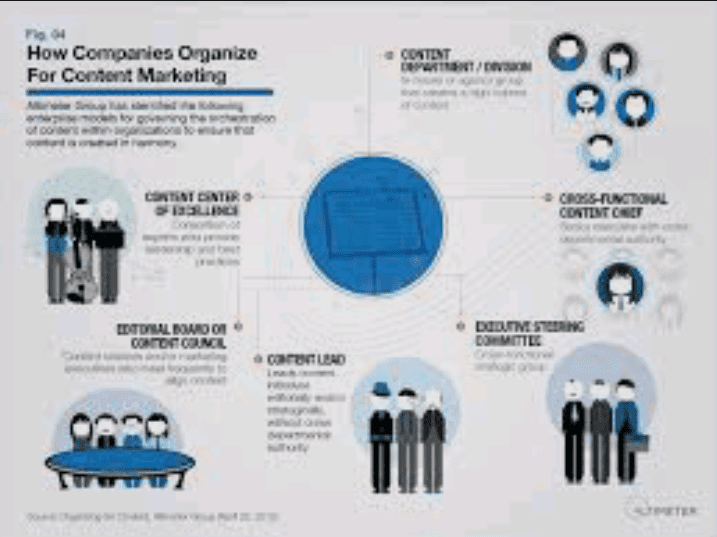Content marketing is a digital marketing strategy that involves creating, publishing, and distributing content for the purpose of attracting and retaining a clearly defined audience and, ultimately, driving profitable customer action.
It’s a long-term, strategic approach that focuses on building relationships with your target audience by delivering valuable and relevant content, information, and insights.
One of the key benefits of content marketing is that it helps you establish your brand as a thought leader and authority in your industry. This not only helps to attract new customers but also helps to retain existing ones.
By providing your target audience with valuable information, you build trust and establish yourself as an expert, making it more likely that people will turn to your brand when they need products or services related to your area of expertise.
Content marketing is not just about creating content and sharing it with the world. It’s about understanding your target audience, what they need and want, and what types of content will resonate with them.
This requires research, understanding your audience personas, and creating a content marketing plan that is tailored to your specific audience.
One of the most important elements of content marketing is creating a variety of content formats, such as blogs, videos, infographics, ebooks, and social media posts. This allows you to reach your target audience where they are, using the channels and formats they prefer.
Additionally, by creating different types of content, you can appeal to a wider range of people and reach new audience members who may have previously been uninterested in your brand.
Another important aspect of content marketing is distribution. Once you have created valuable content, you need to get it in front of your target audience.
There are a variety of channels you can use to distribute your content, including your own website, social media, email, and other marketing channels. The key is to ensure that your content is seen by the right people, at the right time, and in the right format.
It’s important to measure and track the success of your content marketing efforts. This requires setting goals, tracking metrics, and analyzing the results of your efforts. This will help you identify what’s working, what’s not, and make adjustments as needed.
Content marketing is a powerful digital marketing strategy that can help you establish your brand as a thought leader, build trust with your target audience, and drive profitable customer action.
However, it requires a well thought-out plan, a deep understanding of your target audience, and a commitment to creating and distributing valuable content. When executed correctly, content marketing can have a significant impact on your brand and help you reach new levels of success
Read Also: Building Your Dream Team: A Guide To Network Marketing Success
Content Marketing Policy Essentials

Content marketing is a strategic approach to creating and sharing valuable, relevant, and consistent content with the aim of attracting and retaining a specific target audience and ultimately, driving profitable customer action.
A well-defined content marketing policy can help ensure that your efforts are effective and aligned with your business goals.
Here are some key components to consider when creating your content marketing policy:
Define your target audience: Understanding who you want to reach with your content is critical. Consider demographic information such as age, gender, and location, as well as interests and pain points that your content can address.
Establish your brand voice and tone: Your brand voice and tone should be consistent across all of your content, helping to build a strong and recognizable brand identity. Consider the emotions and values you want to convey and how you want to differentiate yourself from competitors.
Determine your content goals: What do you want to achieve with your content marketing efforts? Your goals might include increasing brand awareness, driving website traffic, generating leads, or boosting sales.
Choose your content formats: There are many different formats you can use for your content, including blog posts, videos, infographics, and social media posts. Consider which formats are most appropriate for your target audience and goals.
Decide on a content calendar: A content calendar can help you plan and organize your content in advance, ensuring that you’re consistently publishing new material and keeping your audience engaged.
Assign roles and responsibilities: Decide who will be responsible for creating, editing, and publishing your content. This might include in-house teams, freelance writers, or a combination of both.
Define a review and approval process: Establish a clear process for reviewing and approving content to ensure that it aligns with your brand and goals.
Measure and evaluate your success: Regularly measure and evaluate the success of your content marketing efforts to ensure that you’re making progress towards your goals. Use analytics tools to track metrics such as website traffic, engagement rates, and conversion rates.
A Well defined content marketing policy can help ensure that your content marketing efforts are effective, efficient, and aligned with your business goals. By following these steps, you can create a framework for success and consistently deliver valuable content to your target audience.
Read Also: Influencer Marketing: Maximizing the Power of Influencer Marketing
Benefits of Content Marketing
Content marketing is a strategy that involves creating and sharing valuable, relevant, and consistent content to attract and retain a clearly defined audience and, ultimately, to drive profitable customer action.
In the digital age, content marketing has become a key component of any successful marketing plan, offering a range of benefits to businesses of all sizes and across all industries.
Increased brand awareness: One of the primary benefits of content marketing is the ability to raise awareness of your brand and build a loyal following. By creating content that resonates with your target audience, you can establish your company as a thought leader in your industry and cultivate a community of customers who are more likely to recommend your brand to others.
Improved search engine optimization (SEO): Search engines reward websites that publish high-quality, relevant content on a regular basis. By incorporating keywords and phrases related to your business and industry, you can increase your visibility in search results and drive more organic traffic to your website.
Lead generation: Content marketing can also be used to generate leads and nurture them into paying customers. For example, you can offer gated content like ebooks, webinars, and white papers in exchange for contact information, allowing you to collect valuable data on potential customers and keep them engaged with your brand.
Cost-effectiveness: Compared to traditional marketing methods like print or television advertising, content marketing is a relatively low-cost option. By creating and sharing content on your website and social media channels, you can reach a large and diverse audience at a fraction of the cost of traditional marketing efforts.
Customer engagement: By providing valuable and relevant content to your audience, you can build trust and establish a relationship with your customers. This engagement can lead to increased loyalty and customer lifetime value, as well as provide valuable insights into the needs and preferences of your target audience.
Increased customer retention: By providing ongoing value to your customers through content marketing, you can keep them engaged with your brand and reduce customer churn. Regular content updates also provide a reason for customers to keep coming back to your website, which can lead to repeat business and word-of-mouth referrals.
Differentiation: Content marketing can help you differentiate your brand from your competitors by providing unique and valuable insights and perspectives. By offering a different perspective or addressing topics that your competitors aren’t, you can establish yourself as a thought leader in your industry and differentiate your brand in the minds of your target audience.
In conclusion, content marketing is a valuable strategy that can help businesses achieve their marketing goals while also providing valuable benefits to their target audience.
From increased brand awareness and improved search engine optimization to lead generation and customer engagement, content marketing has the potential to drive significant results for businesses of all sizes.
Read Also: 7 great reasons why exercise matters
